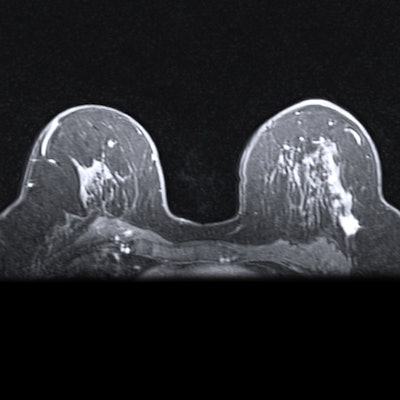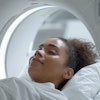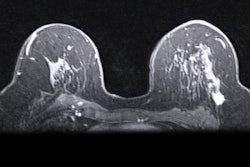
Breast MRI can identify hidden cancers before a woman undergoes planned bilateral prophylactic mastectomy -- thus helping clinicians determine whether sentinel lymph node sampling is needed before surgery.
MRI can help identify high-risk women with occult breast malignancy who might benefit from sentinel lymph node identification at the time of prophylactic mastectomy to guide future treatment, said Dr. Andrew Taliaferro of the University of California, San Francisco in a presentation at this month's virtual American Roentgen Ray Society (ARRS) conference.
Bilateral prophylactic mastectomy is an effective way to reduce breast cancer risk among high-risk women. But up to 11% of prophylactic mastectomy specimens hide malignancy that would have prompted additional axillary evaluation -- a task that can't be done postmastectomy, the group noted. And since no guidelines have been established as of yet for imaging prior to bilateral prophylactic mastectomy, Taliaferro's team evaluated the use of breast MRI for this indication.
The researchers used data from 60 patients who underwent breast MRI between 2000 and 2020. Most (71.7%) had a known hereditary gene mutation. Of these women, 37 (62%) had a negative MRI scan (BI-RADS 1 or 2) and 23 (38.3%) had a positive exam (BI-RADS 3 or higher).
Of those with a positive MRI, 14 (60.9%) underwent biopsy, which identified one cancer (7%), a moderate- to high-grade ductal carcinoma in situ (DCIS). All 23 patients with positive MRI exams underwent prophylactic bilateral mastectomy; these surgeries uncovered two additional cancers (one high-grade DCIS and an invasive lobular cancer).
Of the 37 women with negative MRI exams, 31 (83.8%) chose prophylactic mastectomy. None of these surgeries identified any cancer. The remaining six women chose long-term follow-up and did not develop cancer.
Taliaferro and colleagues' findings regarding breast MRI's performance ahead of bilateral mastectomy are shown in the table below.
| Breast MRI's performance for indication of planned prophylactic mastectomy | ||
| Measure | All malignancy | Invasive malignancy |
| Negative predictive value | 100% | 100% |
| Positive predictive value | 13% | 4% |
| Sensitivity | 100% | 100% |
| Specificity | 65% | 63% |
The study results highlight breast MRI's potential for identifying which patients might need additional workup before going to surgery.
"When performed before planned prophylactic mastectomy, breast MRI is highly sensitive for occult malignancy, and may help determine the need for sentinel lymph node sampling, which could save the patient a second trip to the operating room," Taliaferro told AuntMinnie.com.
More research is necessary, according to the investigators.
"Larger studies are needed to establish consensus guidelines on preoperative breast MRI prior to prophylactic bilateral mastectomy," they concluded.





















